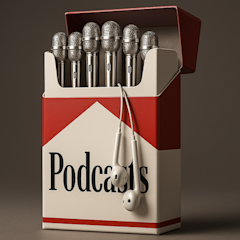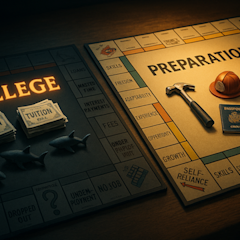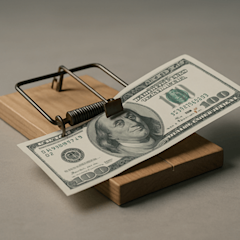How I Learned Not to Panic
I’ve interviewed a lot of smart people.
Billionaires. Bestselling authors. One guy who went from panic attacks on live TV to bestselling author on how to keep calm under pressure.
But Robert Rosenkranz? He’s one of the most unique guests I’ve had on my podcast. (Link below.)
Before writing The Stoic Capitalist about how he applied stoic principles over his 50-year career to navigate high-stakes decisions, build successful businesses, and stay rational under pressure…
He put 100% of his liquid net worth—all his money—on the line for one deal. A single bad week and boom, back to zero.
Except… he wasn’t some 22-year-old crypto bro. He was 35. At the top of his game as a partner at Oppenheimer.
Why would anyone do that?
Because, he told me, he did the math. Rationally. Coldly. Stoically.
He didn't catastrophize.
He didn’t curl up into a fetal position thinking about the Sony Walkman killing his record cover business (yes, that happened).
He zoomed out, thought clearly, made the best decision based on the info he had… and lived to fund another day.
Freedom From Outcome Addiction
Here’s one thing that stuck with me: “Don’t judge decisions by their outcomes—judge them by the quality of the thinking at the time.”
BOOM.
I’ve spent most of my life doing the opposite. I think most people have.
I would launch a business, fail, and think: “I’m a failure.”
But Robert? He launches a business, Sony nukes the industry, and he’s like: “Well, that sucked. But I made a good decision.”
And you know what? That tiny shift in thinking—it’s everything.
It’s the difference between:
- “I got dumped, I’m worthless”
- “I showed up with love and integrity. That’s all I can control.”
Or:
- “I missed Bitcoin at $200, I’m an idiot.”
- “I evaluated the risk-reward at the time. That was the best move I had.”
It’s freedom from outcome addiction.
It’s emotional sobriety.
It’s stoic capitalism... with a capital gains twist.
Why Panic is Useless
Robert’s life isn’t just a masterclass in rationality. It’s a masterclass in curiosity.
He read biographies not for trivia—but for blueprints. He asked: “Is my life such that someone could write a biography of me?”
Do you realize how insane—and beautiful—that question is?
It makes you stop doomscrolling. It makes you put down the anxiety blanket. It makes you ask:
- Am I thinking clearly?
- Am I acting intentionally?
- Am I doing things worth remembering?
Here's what I took away from our conversation (and why I think The Stoic Capitalist is a must-read):
- You can’t think clearly if you’re emotionally drunk. Stoicism is not about being cold. It’s about sobriety from unuseful panic.
- Catastrophizing is an addiction. Most of us are hooked. And it’s ruining our ability to take bold, rational risks.
- You’re allowed to aim high. He read Carnegie. Rockefeller. He wanted to be biography-worthy. That allowed him to be bolder, take more risks, and think clearly about them.
- Worst case thinking is useful only if it’s realistic. Living under a bridge? Unlikely. Losing your job and starting over with your skills intact? Happens every day.
- Your spouse matters. When Robert risked everything, his wife cheered him on. That’s rare. And priceless.
There’s a lot more in my podcast. We dove deeper into his thoughts on investing through chaos and why catastrophizing is ruining your life.










